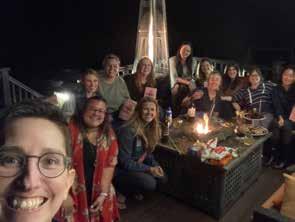
6 minute read
Who Will Be Their Advocate? A Commentary on Facing Illness Alone
Jennifer Gemmill, MD FAAEM
I am a terrible patient. I will refuse medicines prescribed to me. I will pick up my heavy 2-year-old just hours after delivering my newborn while the L&D nurses give me the evil eye. I will remove my own loop recorder in my bathroom at home instead of having it taken out by my unknowing cardiologist (it’s amazing how useful leftover lidocaine and eyebrow tweezers can be). If you are my physician for any reason, I will be a handful. However, I will also be my strongest advocate.
As a practicing emergency physician, I have the tools, knowledge, and experience to know what questions to ask as it pertains to my own personal care. I understand the risks of procedures, what complications to look for, and how to mentally and physically prepare for what a medicine or intervention will do to my body. Most of our patients do not possess these skills. They rely on us to appropriately explain what we’re doing to them and why. Our patients trust us to ensure their safety and we are tasked with making sure they understand the care we’re providing them. But what if they don’t? What if they are altered, unconscious, too sick to know what is happening to them? Who do we, as providers, turn to for consent or discussion of options, or basic medical information? Family. We rely on the patients’ family members to provide basic yet invaluable information about their history, their wishes, their clinical course when the patients cannot speak for themselves. We rely on family to help us convince the patient that the intervention we’re suggesting is needed, necessary. We rely on the family to help ensure that the patient takes their medicine, supports their smoking cessation, keeps wearing their oxygen masks, avoids eating hamburgers every day. Family support is crucial to medical practice and clinical improvement, both in the home and in the
hospital. When faced with my first intubation as a patient, my mother sat at my bedside, grilling the anesthesiologist. She asked him questions that I frankly, despite my having intubated thousands of patients in my career, was just too nervous to ask. I knew everything that could go wrong. Knew exactly what would happen when he gave me the Versed then wheeled me to the OR. But in that moment, all I could think about was how hungry I was and whether or not he’d accidentally chip my tooth with the blade. I needed her there to help me be a regular patient, not a doctor. When the anesthesiologist left the room, she said to me, “I like him.” I immediately felt calmer. I took my Versed obediently then closed my eyes as they rolled me away.
As COVID cases hit their first peak in my hometown, my administration chose to stop allowing visitors into the hospital, both in the ED and on the inpatient floors. I understood the logic of this choice at the time. Fewer people in the building meant fewer chances of accidental transmission and spread of the virus. What was unforeseen, however, was the dramatic impact that would have on our patients. I found myself working up many patients on which I had no information at all: no prior medical history, no knowledge of their primary physician, medication use, or allergies. This not only made my job even more difficult but it added time, extraneous testing, and additional cost to the patient’s visit. That’s to say nothing about the friction it caused for my front-end staff. Families being turned away, sometimes with the needed assistance of our security staff, upset that they could not stay with their spouse, their mother, their sister, or their helpless elderly relative. I watched a 65-year-old man with Alzheimer’s tear up because he couldn’t remember the name of his doctor and told me to ask his wife. I frantically resuscitated a man with hypotension and bradycardia for multiple hours with no effect, only to discover later that he had
intentionally overdosed on his blood pressure meds. We were lucky that his spouse called us in the ED to read the suicide note. I cried over the phone with the daughter of a man brought in by EMS alive, only to “code” a short time later. I pronounced his time of death, then had to tell her she couldn’t see her father again because he died of COVID. There are few times in my career thus far that I’ve felt uncomfortable doing my job. This was one of those times. Not allowing this daughter to see her dead father felt wrong. Ethically, morally, and physically wrong. No one should have to say goodbye to their loved ones at the door and wonder if they will ever see them again. >>
The Coronavirus pandemic has changed the way we practice medicine. It has changed the way we interact and socialize, at work and at home. COVID will continue to impact our lives inside and outside the hospital until we have a way to either prevent it, or eradicate it. But there are some things that no virus or other infectious disease will ever be able to
change. And that is the strength that we pull from our family and friends in times of despair and joy. We need our families around us during this time, and so do our patients. As providers, we will continue to provide the best care within our capabilities, but we need the assistance and advocacy of our patient’s family and loved ones. We need to have them to be present, safely, at the bedside to speak for the patient when the patient cannot, to encourage the recovery of each patient and to support us as providers as we battle this disease and all the others.
I am a terrible patient, but having my mom at the bedside makes be a better one. Family presence makes us stronger. Our patients need this extra strength.
For more information, view the new AAEM position statement on emergency department visitation policies during the COVID-19 pandemic on page 14.
Now Accepting 2021 Membership
www.aaem.org/whyaaem
A Strong Voice Your concerns reach the ears of our leaders in Washington.
Applications!
AAEM actively works to ensure the needs of EPs are being addressed on the national and state levels. We offer support & legal assistance to members whose rights are threatened. The strength of the Academy is in your corner.
Effective Advocacy For over 20 years we have been committed to your personal and professional well being. Our primary concern is supporting you: your practice rights, your autonomy, your relationship with your patients. That’s the AAEM difference.
Why I Joined Hear from fellow EPs why they chose to become a member and how AAEM is addressing APP independent practice.
Top Tier Education In addition to the Annual Scientific Assembly, AAEM offers educational opportunities online and in-person at our Oral Board Review, Written Board Review, and ED Management Solutions courses, as well as other regional courses and meetings.

Meaningful Connections AAEM is over 8,000 members strong and growing. We offer multiple ways for you to get involved with the topics that matter most to you through engaging committees & projects plus multiple ways to network with fellow members in the U.S. and around the globe.










